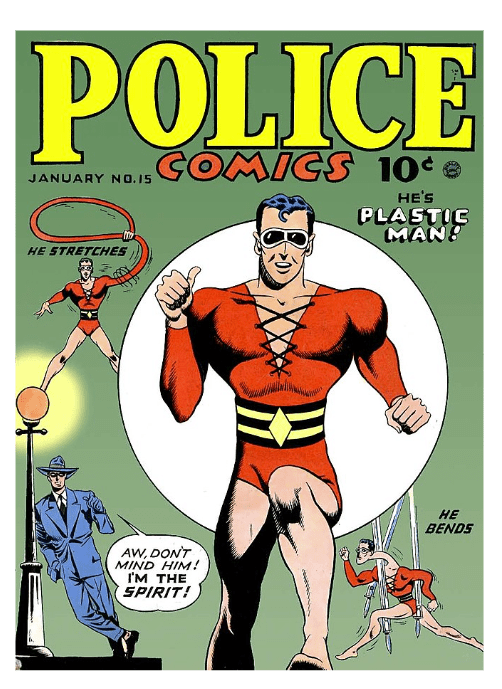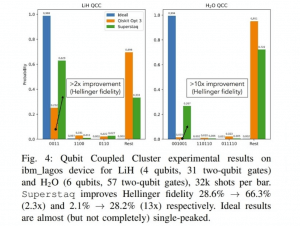Looking at Infleqtion’s “Plastic Man” Superstaq Software-by Brian Siegelwax

Infleqtion hosted a March 21, 2024 webinar titled “Extreme Optimization for Quantum Computing with Superstaq.” Their goal was to present, as they put it, “Superstaq in practice.” If you missed the webinar, the key takeaway is that if Superstaq was a comic book superhero, it would be the Justice League’s Plastic Man.
If you don’t know who Plastic Man is, don’t worry. All you need to know is that the following subheadings are all adjectives that describe him.
Elastic
Superstaq stretches up and down the quantum software stack, including hardware, control systems, compilers, algorithms, measurement error mitigation, and applications. When Infleqtion uses the term “extreme optimization,” it refers to deep optimization across these layers.
But that’s not all. Something you won’t find as a standard feature of quantum computing software is that Superstaq stretches into communication and cryptography solutions. They recently announced the latter, in fact, in partnership with NVIDIA for DCM3.
Versatile
Superstaq can be used with the Qiskit and Cirq quantum computing frameworks, arguably the most popular and one of the most popular frameworks, respectively. Consequently, Superstaq is compatible with IBM Quantum, AWS Braket, and Azure Quantum.
But, again, that’s not all. Infleqtion describes Superstaq as enabling “BYO Gates,” or “bring your own gates.” Superstaq can compile quantum circuits to any set of basis gates, which are the gates that actually execute on quantum computer hardware. It can also compile circuits to gates for qudits, which are conceptually like qubits, except that they can be in states higher than just 0 and 1.
Flexible
Although Infleqtion is building a neutral atom quantum computer named Sqorpius, Superstaq has also been demonstrated on superconducting, trapped ion, and silicon spin qubits. They say it should be compatible with all gate-based platforms and are excited to expand to more.

Fidelity graph of the Superstaq system.
https://arxiv.org/abs/2309.05157
Powerful
Through software alone, Infleqtion claims to provide a 10X boost in the accuracy of your algorithms. You can leverage this boost to execute deeper circuits with longer runtimes. They claim to have set a record for simulating a water molecule using dynamic decoupling on IBM Quantum and have also demonstrated such boosts on other platforms.
At the compiler level, their goal is to outperform manual optimization. Despite all the tools available, manual optimization is still commonplace during hackathons, and they want to change that.
Endearing
Optimizing quantum circuits is challenging; Superstaq abstracts away much of the expertise that would normally be needed, making quantum computing substantially more user-friendly. Superstaq is application-agnostic and applied across multiple industries; finance and manufacturing were mentioned specifically. It is also “open source friendly,” as substantiated by the recent publication of a QLDPC repository. In addressing Infleqtion’s advantages versus its competitors, its response wasn’t technical but rather centered on their harmonious collaborations with its partners.
Innovative
Infleqtion claims to have implemented the first-ever two-qutrit SWAP operation on the Advanced Quantum Testbed (AQT) superconducting quantum computer at Berkeley Lab. Whereas a qubit is a two-level system, 0 or 1, a qutrit is a three-level system, 0, 1, or 2.
Talented
Infleqtion implemented a Quantum Characterization, Verification, and Validation (QCVV) technique in Superstaq called Direct Fidelity Estimation (DFE). Using Clifford circuit simulation, QCVV/DFE provides exponentially more efficient quantum state verification, aka “tomography,” by reducing the number of needed shots. In other words, as quantum computers scale up and become harder to simulate classically, this technique will help to verify that the devices are computing properly efficiently.
Transformative
Infleqtion extends Superstaq to implement quantum error correction codes (QECC) and compile circuits for fault-tolerant quantum computing. Although there was no mention of their roadmap at this point of the webinar, this functionality is a logical – pun intended – a necessity for starting to work with their “Sqorpius” device within the next few years.
Resilient
A question was asked about how Infleqtion prevents collaborations from benefiting the competitors of their partners in the likelihood that they also work with their partners’ competitors. They replied that they have firewalls in place within the company to prevent this. They explained that this sort of practice is mandatory to protect government classified information, and it is extended to protect each partner’s confidential information.
Picnokinetic
The Supercheq protocol mentioned in the NVIDIA for DCM3 announcement does something called “quantum fingerprinting.” Imagine needing to compare two datasets that are so massive that it is thoroughly impractical to transmit them. Using Superstaq’s Supercheq protocol, each dataset can be compressed and encoded onto a relatively small number of qubits, thus making their transmission feasible.
Conclusion-Superstaq has it all
Infleqtion announced a $1.2M DOE SBIR Phase IIB award to continue developing Superstaq, so there’s more to come. Will Plastic Man continue to be its incarnation; we’ll have to wait and see.
Infleqtion will have a webinar titled “Security, Defense, and Aerospace” on April 10 and “Enterprise” on May 8. You can register for either or both at https://www.infleqtion.com/events. And for more information about Superstaq, check out https://superstaq.readthedocs.io.
Brian N. Siegelwax is an independent Quantum Algorithm Designer and a freelance writer for Inside Quantum Technology. He is known for his contributions to the field of quantum computing, particularly in the design of quantum algorithms. He has evaluated numerous quantum computing frameworks, platforms, and utilities and has shared his insights and findings through his writings. Siegelwax is also an author and has written books such as “Dungeons & Qubits” and “Choose Your Own Quantum Adventure”. He regularly writes on Medium about various topics related to quantum computing. His work includes practical applications of quantum computing, reviews of quantum computing products, and discussions on quantum computing concepts.
























